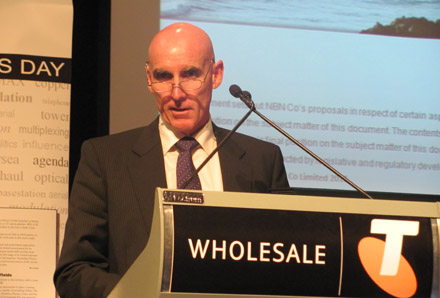Quigley on retiring from NBN Co

Next week will mark four years at NBN Co for the company's first employee and first CEO, Mike Quigley. As the company prepares to replace Quigley following the announcement of his retirement, the CEO has told journalists that the political controversy surrounding the AU$37.4 billion National Broadband Network (NBN) project never got to him.
Quigley came out of retirement in 2009 to take on the task of building the NBN fibre, wireless and satelllite network after an extensive history in telecommunications, with a large portion of his career spent at network giant Alcatel-Lucent.
Prior to the 2010 election, Quigley largely avoided most of the political controversy surrounding the network, aside from announcing that the NBN would have 1Gbps speeds shortly before the August election date. After the election, however, new Shadow Communications Minister Malcolm Turnbull turned his focus onto the CEO and his management of the rollout of the network, which he hit on as being overpriced and too slow.
Despite directly coming under fire from the opposition, Quigley said he did not take the attacks personally.
"The fact that I'm the CEO means I'm going to be subject to some of that as well. It's just a fact of life. It doesn't worry me particularly. It sometimes makes the project a little difficult to do, but I just try to get on with life and try not to allow too much to influence me what is going on externally," he said.
"I let the politicians debate with each other. I can only tell you, this is the right time for me to be leaving."
Quigley said that he decided to wait until NBN Co had reached its June targets before announcing that he was leaving, but said discussions over his decision to leave the company went back "quite some time ago", when former chairman Harrison Young was still with the company.
In reaction to reports that new chairwoman Siobhan McKenna was seeking to replace him, Quigley said he had a good relationship with McKenna, and her appointment as chair had no impact on the timing of his decision to leave NBN Co.
He said the timing was right to leave.
"We've done all the startup, we've done all the architecture, we've done all the product. We're pretty close to having the SAU finally approved. In fact, I hope I can be here for the day when the SAU gets the final stamp of approval," he said.
"It's now a question of continuing that, bedding stuff down and scaling. It just makes good sense for a transition to take place at this time."
On his replacement, Quigley said he believes that the next CEO of NBN Co should have an operational background.
"Operational in terms of a company that builds stuff, builds and runs stuff. I think it would be very useful if someone coming into that job has that particular skill," he said.
"By the way, running a factory is not dissimilar to what we're trying to do. It's a big distributed factory, because you're doing the same thing, [building] these FSAMs all over the country."
Quigley disagreed with Turnbull's assertion that the NBN Co CEO should have telecommunications experience.
"While telco experience would probably be helpful because of all the technology that's in this stuff, it's probably not essential."
Quigley had informed both former Communications Minister Stephen Conroy and new minister Anthony Albanese of his decision before the announcement. He described the former as "a man of quite some vision and drive" and said it was a pleasure to work with him. He said that whoever takes on the role of CEO will need to continue to have a close relationship with the minister of the day.
"The relationship between the CEO and the minister is important. It's unrealistic, given the importance of this project in the portfolio of the communications minister, that the minister won't be asking lots of questions at lots of times about the details of stuff," he said.
He even had praise for Turnbull, who he said has brought the debate forward to the point where everyone has agreed that upgrading broadband in Australia is important, and was able to create a substantial alternative broadband policy without inside knowledge from NBN Co.
"Mr Turnbull's done that without the benefit of having a lot of the detailed information we have inside the company. So it would have been a tough job, and it's quite a formidable document," he said.
He said that the choice between fibre to the premises (FttP) and fibre to the node (FttN) is ultimately a policy decision for the government.
"You can make a larger upfront investment in the fibre, or you can make use of the copper using different technologies. Both of those have pros and cons, and that is a policy choice that can be looked at and worked through," he said.
"There are no simple answers. Even right at the beginning with fibre to the premises, there were a lot of detailed and complex issues to work through."
The CEO said that the NBN is expected to still be on track to be completed by mid-2021, and refused suggestions that the company is "in crisis".
"The management team that reports to me are a very capable team who work extremely well together, and we have no sense of crisis in the company at all," he said.
"I believe that our retention rate is in fact considerably better than the national average. Our turnover is half the national average. That doesn't reflect a company in crisis."
Quigley will stay on as CEO until a replacement is found.
